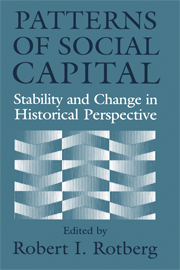Book contents
- Frontmatter
- Contents
- Introduction Social Capital and Political Culture in Africa, America, Australasia, and Europe
- Articles
- Civic Traditions in Premodern Italy
- The Sources of Civil Society in Italy
- Finding Social Capital: The French Revolution in Italy
- Social Capital in the Early Industrial Revolution
- The Diversity of Social Capital in English Communities, 1300–1640 (with a Glance at Modern Nigeria)
- Social and Cultural Capital in Colonial British America: A Case Study
- The Growth of Voluntary Associations in America, 1840–1940
- Civil Society as Democratic Practice: North American Cities during the Nineteenth Century
- Securing Political Returns to Social Capital: Women's Associations in the United States, 1880s–1920s
- Second-Generation Civic America: Education, Citizenship, and the Children of Immigrants
- Human Capital and Social Capital: The Rise of Secondary Schooling in America, 1910–1940
- From Local to National Political Cultures: Social Capital and Civic Organization in the Great Plains
The Growth of Voluntary Associations in America, 1840–1940
Published online by Cambridge University Press: 12 April 2010
- Frontmatter
- Contents
- Introduction Social Capital and Political Culture in Africa, America, Australasia, and Europe
- Articles
- Civic Traditions in Premodern Italy
- The Sources of Civil Society in Italy
- Finding Social Capital: The French Revolution in Italy
- Social Capital in the Early Industrial Revolution
- The Diversity of Social Capital in English Communities, 1300–1640 (with a Glance at Modern Nigeria)
- Social and Cultural Capital in Colonial British America: A Case Study
- The Growth of Voluntary Associations in America, 1840–1940
- Civil Society as Democratic Practice: North American Cities during the Nineteenth Century
- Securing Political Returns to Social Capital: Women's Associations in the United States, 1880s–1920s
- Second-Generation Civic America: Education, Citizenship, and the Children of Immigrants
- Human Capital and Social Capital: The Rise of Secondary Schooling in America, 1910–1940
- From Local to National Political Cultures: Social Capital and Civic Organization in the Great Plains
Summary
Americans are a civic people. Next to the mass political party, probably no aspect of American democracy has been more celebrated than the long-standing proclivity of Americans to join voluntary associations. According to Schlesinger, we are “a nation of joiners.” The joining began in the middle of the eighteenth century, it flourished in the revolutionary committees that undergirded the War of Independence, and it has continued ever since. “Considering the central importance of the voluntary organization in American history there is no doubt it has provided the people with their greatest school of self-government,” Schlesinger writes. “Rubbing minds as well as elbows, they have been trained from youth to take common counsel, choose leaders, harmonize differences, and obey the expressed will of the majority. In mastering the associative way they have mastered the democratic way.”
Schlesinger understood that he was revisiting and updating Tocqueville's famous argument. More than a century earlier, Toc- queville had contended that the abundance of American civil associations contributed to the stability of American democracy. Civil associations, he insisted, were more crucial than political associations to a democratic society. “If the inhabitants of democratic countries had neither the right nor the taste for uniting for political objects, their independence would run great risks, but they could keep both their wealth and their knowledge for a long time,” Tocqueville argued. “But if they did not learn some habits of acting together in the affairs of daily life, civilization itself would be in peril.”
- Type
- Chapter
- Information
- Patterns of Social CapitalStability and Change in Historical Perspective, pp. 173 - 220Publisher: Cambridge University PressPrint publication year: 2000
- 2
- Cited by



